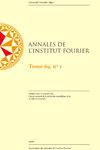Abelianization of some groups of interval exchanges
IF 0.7
4区 数学
Q2 MATHEMATICS
引用次数: 1
Abstract
Let IET be the group of bijections from $\mathopen{[}0,1 \mathclose{[}$ to itself that are continuous outside a finite set, right-continuous and piecewise translations. The abelianization homomorphism $f: \text{IET} \to A$, called SAF-homomorphism, was described by Arnoux-Fathi and Sah. The abelian group $A$ is the second exterior power of the reals over the rationals. For every subgroup $\Gamma$ of $\mathbb{R/Z}$ we define $\text{IET}(\Gamma)$ as the subgroup of $\text{IET}$ consisting of all elements $f$ such that $f$ is continuous outside $\Gamma$. Let $\tilde{\Gamma}$ be the preimage of $\Gamma$ in $\mathbb{R}$. We establish an isomorphism between the abelianization of $\text{IET}(\Gamma)$ and the second skew-symmetric power of $\tilde{\Gamma}$ over $\mathbb{Z}$ denoted by ${}^\circleddash\!\!\bigwedge^2_{\mathbb{Z}} \tilde{\Gamma}$. This group often has non-trivial $2$-torsion, which is not detected by the SAF-homomorphism. We then define $\text{IET}^{\bowtie}$ the group of all interval exchange transformations with flips. Arnoux proved that this group is simple thus perfect. However for every subgroup $\text{IET}^{\bowtie}(\Gamma)$ we establish an isomorphism between its abelianization and $\langle \lbrace a \otimes a ~ [\text{mod}~2] \mid a \in \tilde{\Gamma} \rbrace \rangle \times \langle \lbrace \ell \wedge \ell ~ [\text{mod}~2] \mid \ell \in \tilde{\Gamma} \rbrace \rangle$ which is a $2$-elementary abelian subgroup of $\bigotimes^2_{\mathbb{Z}} \tilde{\Gamma} / (2\bigotimes^2_{\mathbb{Z}} \tilde{\Gamma}) \times {}^\circleddash\!\!\bigwedge^2_{\mathbb{Z}} \tilde{\Gamma} / (2 {}^\circleddash\!\!\bigwedge^2_{\mathbb{Z}} \tilde{\Gamma})$.区间交换若干群的阿贝尔化
设IET为一组从$\mathopen{[}0,1 \mathclose{[}$到自身的双射,它们在有限集合外连续,右连续和分段平移。阿贝尔化同态$f: \text{IET} \to A$,称为saf同态,是由Arnoux-Fathi和Sah描述的。阿贝尔群$A$是实数对有理数的第二个外部幂。对于$\mathbb{R/Z}$的每个子组$\Gamma$,我们将$\text{IET}(\Gamma)$定义为$\text{IET}$的子组,由所有元素$f$组成,使得$f$在$\Gamma$之外连续。设$\tilde{\Gamma}$为$\mathbb{R}$中的$\Gamma$的原映像。建立了$\text{IET}(\Gamma)$的阿贝尔化与$\tilde{\Gamma}$ / $\mathbb{Z}$的二阶偏对称幂(表示为${}^\circleddash\!\!\bigwedge^2_{\mathbb{Z}} \tilde{\Gamma}$)之间的同构关系。这个群通常具有不平凡的$2$ -扭转,这是saf同态检测不到的。然后我们定义$\text{IET}^{\bowtie}$所有带翻转的区间交换变换的集合。Arnoux证明了这个群体是简单的,因此是完美的。然而对于每一个子群$\text{IET}^{\bowtie}(\Gamma)$,我们建立了它的阿贝尔化与$\langle \lbrace a \otimes a ~ [\text{mod}~2] \mid a \in \tilde{\Gamma} \rbrace \rangle \times \langle \lbrace \ell \wedge \ell ~ [\text{mod}~2] \mid \ell \in \tilde{\Gamma} \rbrace \rangle$之间的同构,这是$\bigotimes^2_{\mathbb{Z}} \tilde{\Gamma} / (2\bigotimes^2_{\mathbb{Z}} \tilde{\Gamma}) \times {}^\circleddash\!\!\bigwedge^2_{\mathbb{Z}} \tilde{\Gamma} / (2 {}^\circleddash\!\!\bigwedge^2_{\mathbb{Z}} \tilde{\Gamma})$的一个$2$ -初等阿贝尔子群。
本文章由计算机程序翻译,如有差异,请以英文原文为准。
求助全文
约1分钟内获得全文
求助全文
来源期刊
CiteScore
1.70
自引率
0.00%
发文量
92
审稿时长
1 months
期刊介绍:
The Annales de l’Institut Fourier aim at publishing original papers of a high level in all fields of mathematics, either in English or in French.
The Editorial Board encourages submission of articles containing an original and important result, or presenting a new proof of a central result in a domain of mathematics. Also, the Annales de l’Institut Fourier being a general purpose journal, highly specialized articles can only be accepted if their exposition makes them accessible to a larger audience.

 求助内容:
求助内容: 应助结果提醒方式:
应助结果提醒方式:


